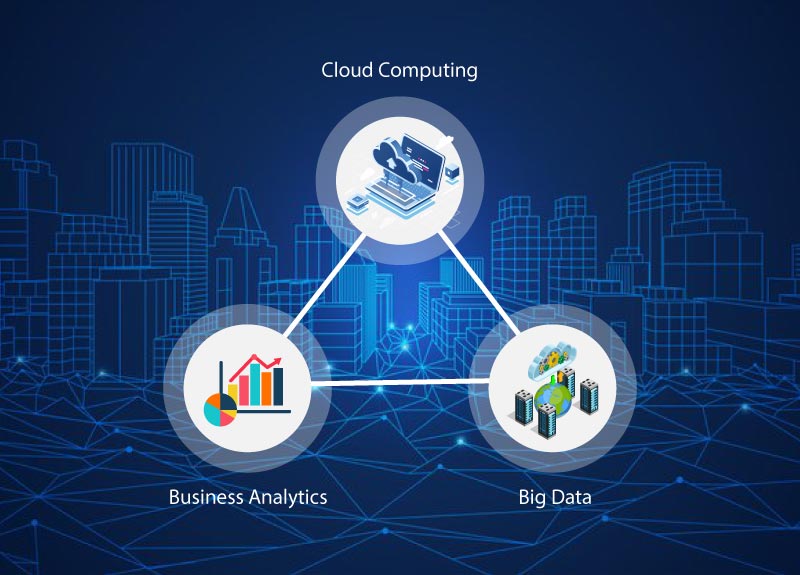Business Analytics & Big Data In Cloud Computing
Cloud computing become more important nowadays, especially for public sector in the nation that consists of 17.000 islands. Cloud computing can better facilitate external collaboration with partners and users or customers, in order to boost productivity in many sectors. For example, health information network enables the exchange of health information and transactions among healthcare providers, employers, payers, practitioners, third-party administrators and patients in Indonesia. By connecting thousands hospitals and thousands doctors, the business entity or government can facilitate better collaboration and information sharing, helping deliver improved care at a low cost. It also can be applied in education and other sectors.
Indonesia’s cloud services market is set for rapid growth due to growth in online media consumption and the demand for cloud-based disaster recovery solutions. Based on forecasting done by Frost & Sullivan, Indonesian cloud computing spend was approximately USD 172 million in 2016 and is expected to reach USD 1.2 billion in 2022.
Cloud computing is more than simply saving on IT implementation costs. Cloud offers enormous opportunity for new innovation, and even disruption of entire industries. Cloud computing and storage platforms offer advantages over conventional on-premise systems, from lower operating costs to better compatibility with the working styles of digital enterprises. Cloud computing is the delivery of computing services—including servers, storage, databases, networking, software, analytics, and intelligence—over the Internet (“the cloud”) to offer faster innovation, flexible resources, and economies of scale.
Cloud computing is a big shift for traditional way of businesses to think about IT resources. There are some benefit reasons on why organizations are turning to cloud computing services, which are: Cost efficiency, faster process, accessibility, reliability, and security.
Organization eliminates the capital expense of buying hardware and software by implementing cloud computing. The process of setting up and running the cloud will be on-site datacenters, so it does not need IT expert for managing the infrastructure within the organization, hence will reduce the cost.
Mostly, the services are self service and on demand. Even though there are abundant of computing resources, they can be supplied in minutes. Moreover, cloud computing can give organizations a lot of flexibility and take the pressure off capacity planning with typically just a few clicks. Cloud computing also allows faster process. The benefits include the ability to access and scale data elastically by delivering the right amount of IT resources, such as computing power, storage and bandwidth properly when it is needed and from the right geographic location.
Cloud computing creates data backup, disaster recovery and business continuity easier and less expensive because data can be mirrored at multiple redundant sites on the cloud provider’s network. Reliable cloud computing.
Many organizations concern with data security in cloud. Currently, many cloud providers offer a broad set of policies, technologies and controls that strengthen security overall, to protect data, apps and infrastructure from potential threats.
Cloud computing does not limit only up to storage of the files on the cloud, but it also optimize the way of storing and analyzing data with the help of comprehensive computing resources.
Business Analytic
Alongside cloud computing, data analytic also helps to make business more effective and the consolidation of both clouds and analytics could help businesses store, interpret, and process their big data to better meet their clients’ needs. Businesses have used data analytics to help direct their strategy to maximize profits. Ideally data analytics helps eliminate much of the guesswork involved in trying to understand clients, instead systemically tracking data patterns to best construct business tactics and operations to minimize uncertainty.
Data analytics in cloud computing, such as tracking social media traffic and engagement, is simply applying the principles of analytics to information housed on cloud drives rather than on individual servers or drives.
The benefit of data analysis is its ability to recognize patterns in a set and make predictions regarding past experiences and real-time data. Much of their potential benefit is missed because employees lack quick, reliable access to said information. Many companies do not reap the full benefit of their big data analytics because of lack of accessibility to data, causing them to miss potential opportunities to better connect with and meet clients’ needs. In cloud computing, data analysis gains accessibility as company employees can access company information remotely from any location, freeing them from being chained to local networks and thus making data more accessible. Company able to unveiled its data analytics cloud system, which allows their employees to better utilize data in hopes of equipping them to increase business value.
Big Data
The huge amount of data produced in our everyday life, and still, the number is increasing. Surplus data is floating and how to use it is by using the technology of Big Data Analytics is what matters the most.
The traditional systems for storing and managing data are a slower, time-consuming and boring process. Cloud computing is the solution including its application and resources essential for big data. The practical nature of cloud benefits high demand business that is seeking exceptional physical servers in the cluster to serve the needs with increased processing power and storage space.
As the data is doubling every two years, there are many companies currently prefer implementing Big Data. Big data is a solution for growing and moving sources like Mobile, Computer, Social Media and Sensors.
Cloud computing, Data Analytic and Big Data are technologies that have changed the way organizations react to process and implement business.

